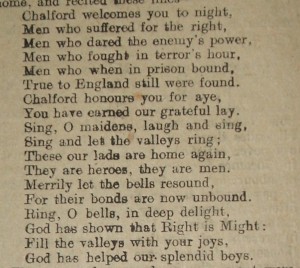Although progress was slow, men were returning from service. There was the odd unexpected problem – a letter to the ‘Journal’ in late February raised the matter of demobbed servicemen arriving at Stroud too late for public transport to take them home, and suggested that a list of ‘owners of motor cars’ willing to provide lifts be drawn up. The paper also published an understandably bitter letter from ‘A Stroud Tommy’, who had been drafted to the Military Police from his battalion in the Balkans:
…to allow men to be demobilised who have as little as two or three years’ non-combatant service to their credit and have not seen a bullet or a shell…I have no doubt that all lovers of fair play will agree that this treatment is a great injustice to the men who have done their bit in defence of the country they love, and helped to give Johnny Turk his quietus.
In March, an official plea went out from the British YMCA for 50 men from Gloucestershire (presumably other counties were being similarly petitioned!) to staff the huts abroad which acted as canteens, quiet rooms and ‘facilities for reading and writing’, providing ‘relief from the monotony of Army life’. The advertisement stated that ‘whilst thousands of…men are being daily demobilised, a great number are being retained by military necessities, and it is inevitable that thousands of them must remain in the Army for some time to come’. Travelling expenses, board and lodging plus a financial allowance ‘according to the individual needs of the applicant’ would be provided, with a minimum stay of four months in France, six in the Far East.
 interior of YMCA hut on the Western Front
interior of YMCA hut on the Western Front
Chalford Tabernacle saw the wedding of the recently returned Harry Bown, who had served two years in Salonika, and Ellen Fern.
‘Nobby’ Brown, of Eastcombe, was at home ‘waiting his final discharge from the Army, in which he played footer, and is yearning for a game now’. He:
…has served in the Army for about four years. Before joining up, he was an employee at Brimscombe Brewery, and he looks happy and fit. In his own cheery way he confessed to an old sporting friend on Wednesday morning, that he had not done badly in the Army. He obtained commendation for good conduct, and wears the 1915 ribbon.
Corpl Tom Juggins of Bisley, who had ‘seen much fighting in France and Flanders’ with the 8th Glosters, visited his old school to show off his Military Medal, won ‘for conspicuous bravery on two or three occasions’ (the children were ‘much interested’). Tom had been an apprentice with Mr Messenger ‘shoeing smith and cycle agent, before the war, and had returned to the scene of his former labours, with the intention subsequently when Mr Messenger retires, of acquiring the business …As an enthusiastic scout in his boyhood days, Tom now takes great interest in the Bisley and Eastcombe Troop of Boy Scouts, and in the Oakridge troop’.
‘Flu became a notifiable disease from March 1st, which seems very late in the day, given that it had been ravaging the World for well over a year. During March, it was reported that Chalford was experiencing a large number of cases of ‘flu, but that victims were recovering well.
In accordance with national post war reforms, a 47 hour week had been arranged at several factories in the Golden Valley, including Chalford Woodworkers, where the management arranged a meeting with ‘men from the different departments’ to arrange the hours so they would be ‘mutually satisfactory…the workers cordially appreciated the invitation…’.
‘Aquaticus’ was amused by the announcement that VTC members would be permitted to keep their uniforms:
In these times of fierce tailors’ prices, it is quite a treat to know that at least we shall have one whole suit we can don to cover our nakedness, namely the old uniform.
Bisley Pig Club was dissolved at the end of February, since meat supplies were improving. There had been 14 ‘participatory members, chiefly cottagers who participated in the 9 pigs bought last June’:
The pigs were fattened with ‘club’ meal, the peculiar rationing scheme of the Government in November presenting some unlooked-for difficulties…The members at last obtained excellent bacon at almost 50% less than controlled price…
At the end of the syndicated column entitled ‘Out of Doors in March’, by C D Desmond in the ‘Daily News’, there is a curious item about a singing mouse. This was obviously a hot topic of the day, though I have been unable to trace a discussion of it at that point. (Idle Googling finds references to Central American mice, and a 1936 ‘Time’ story about a mouse that was broadcast on NBC, chirping ‘like a canary’. I also found an earlier account in a children’s book called Little Folks in Feathers and Fur, written by Harriet Miller and published in 1875:
Desmond notes that he has received some correspondence on the subject and continues:
One of these is to be heard at any hour of the day in the cottage of a friend of mine: it has dispelled all other theories as to the source of the ‘song’ by actually performing in public. Its ‘song’ is not unlike the chirrup of the linnet before it gets into full voice. I believe it is the outcome of some asthmatic affection of some kind…


